Duke of Cambridge: Scale of Holocaust terrifying
- Published
The duke lays a wreath in a simple ceremony
The Duke of Cambridge has described the sight of shoes left behind by Jews killed in a Nazi extermination camp as "terrifying".
On a visit to Yad Vashem, the World Holocaust Remembrance Centre in Jerusalem, he said he was "trying to comprehend the scale" of the atrocity.
Later in a speech, he said: "Never has hope and reconciliation been more needed."
To finish the day he played football at a youth event and watched volleyball.
During his visit, part of the first official trip to Israel and the Palestinian territories by a UK royal, the prince laid a wreath where ashes of victims of the Holocaust were buried.
He also met two survivors of the Holocaust, in which six million Jews were murdered during World War Two.
In a speech at a reception hosted by the British ambassador, Prince William said the visit to Yad Vashem was "profoundly moving" and said ties between Britain and Israel had "never been stronger".
He said: "In the past century, the people of the Middle East have suffered great sadness and loss. Never has hope and reconciliation been more needed.
"I know I share a desire with all of you - and with your neighbours - for a just and lasting peace."
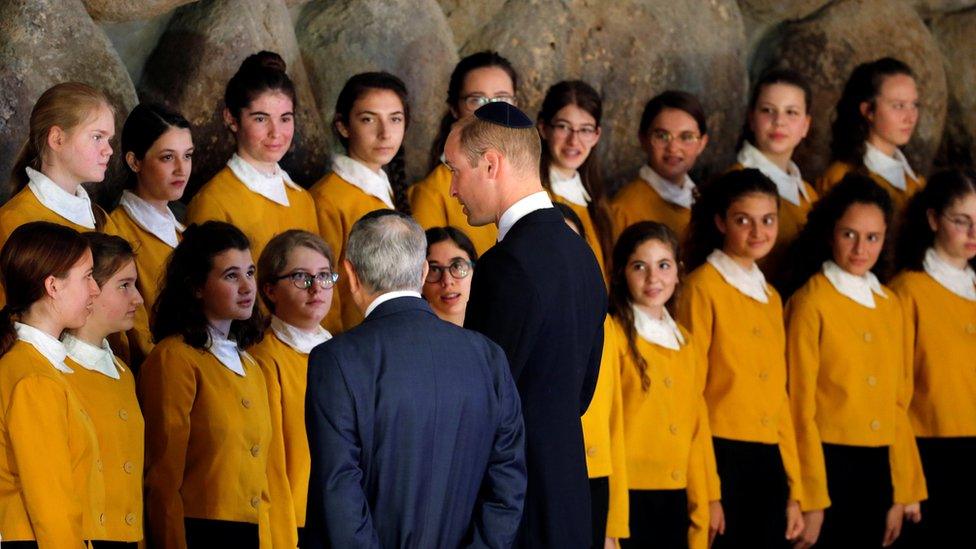
A girls' choir sang at the wreath-laying ceremony
Later, the duke was greeted by Israel's prime minister Benjamin Netanyahu and his wife, Sara, at his residence.
There he met relatives of the late Rachel Cohen, who was hidden from the Gestapo by Princess Alice - mother of the Duke of Edinburgh - in her palace in Greece.
"You must be very proud of your great-grandmother, who saved defenceless Jews," Mr Netanyahu told the prince.
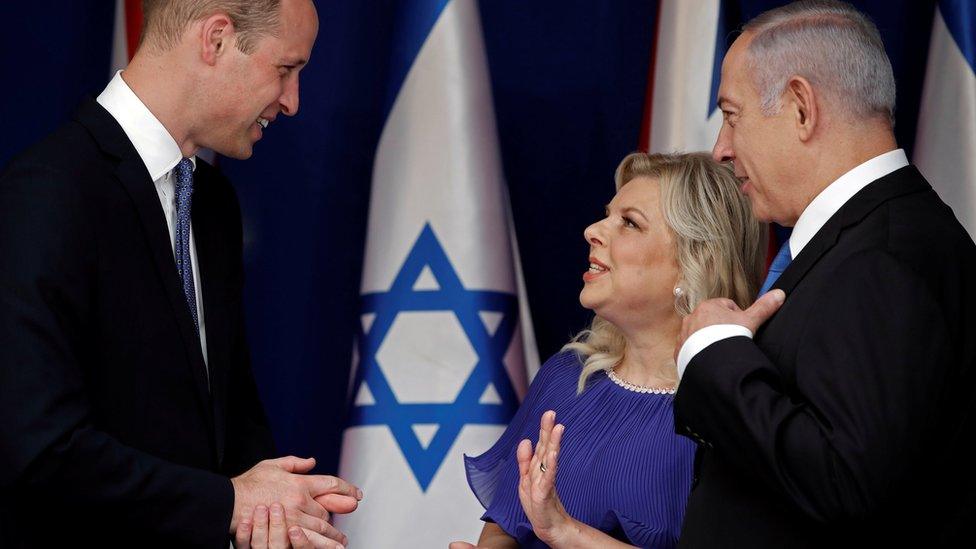
Benjamin Netanyahu and his wife, Sara, meet the prince
Following the meeting, the Foreign Press Association condemned as "disgraceful" an alleged incident of a journalist being barred.
The Associated Press's chief television producer, Nebi Qena, who is originally from Albania, said security guards repeatedly asked about his "extraction" and only let him in once other reporters were leaving.
Afterwards, the security department of the Israeli Prime Minister's Office blamed the incident on "human error". "We regret any distress or discomfort," it said.
Allow X content?
This article contains content provided by X. We ask for your permission before anything is loaded, as they may be using cookies and other technologies. You may want to read X’s cookie policy, external and privacy policy, external before accepting. To view this content choose ‘accept and continue’.
The duke also met the country's president, Reuven Rivlin, who called on him to take "a message of peace" to Palestinian Authority president Mahmoud Abbas, whom he will meet later in his trip.
"It is about time that we have to find together the way to build confidence," said Mr Rivlin.
"Build confidence as a first step to bring to understanding that we have to bring to an end the tragedy between us that goes along for more than 120 years."
The duke responded, saying: "I, like you, am hoping that peace in the area can be achieved."

Prince impresses his hosts
By BBC royal correspondent Jonny Dymond
There were two Prince Williams on display in Israel today.
The first, sombre-suited, awed by the enormity of the Holocaust, laid a wreath over the ashes of Jews murdered in the Holocaust.
The second, in trainers, sunglasses and rolled-up shirtsleeves, high-fived and grinned his way through football practice with young Israeli and Palestinian kids.
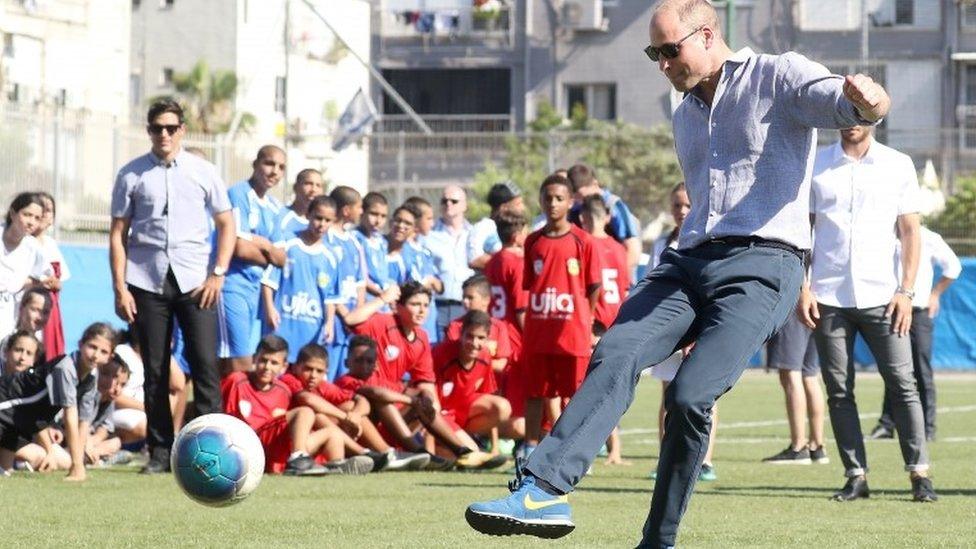
The duke shows off his ball skills
Both princes wanted to learn about and understand this complicated country. Both clearly impressed their hosts. And each complemented the work of the other.
You can overdo the sensitivities of this trip. The prince does not do press conferences, nor question and answer sessions with the public. Much is down to the planning of the visit.
But Prince William has showed himself as serious, enthusiastic, versatile and fun. It's hard to imagine anything but good reviews so far.

The duke's afternoon was spent visiting the city of Jaffa, where he met young Arab and Jewish Israelis playing football together.
They are involved in two charities - the Equaliser and the Peres Centre for Peace - which focus on bringing together youngsters of different religious and ethnic communities through football.
Asked to take part in a penalty shoot-out, Prince William joked: "I'm a defender - it's going to go up there in that tree somewhere."
His first strike was saved but the other two hit the back of the net, prompting celebrations by the duke, who is president of the FA and a keen Aston Villa fan.
Later he went to a beach in Tel Aviv where he watched young athletes play volleyball and chatted with beachgoers.
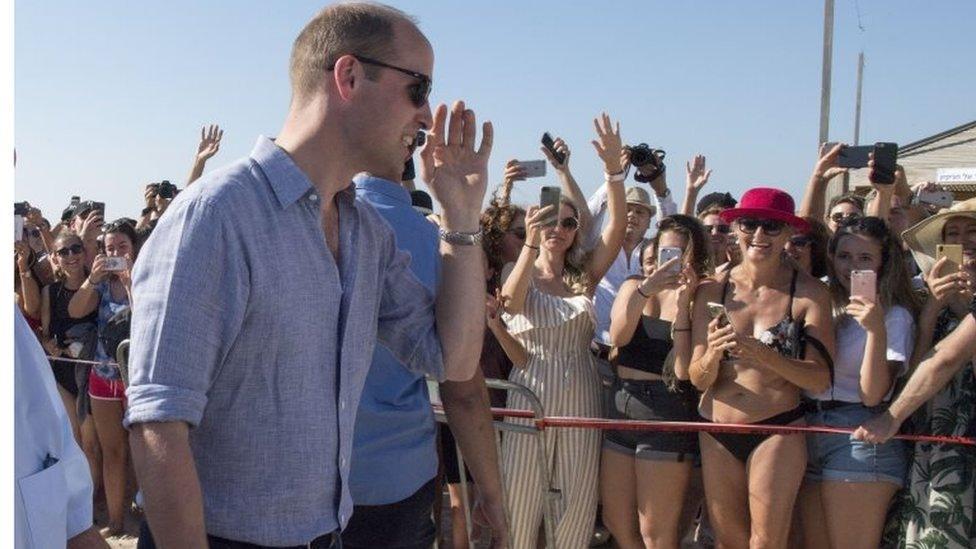
Crowds greet the duke as he arrives to watch the volleyball match
Kensington Palace has stressed that the five-day trip is non-political, as with all royal visits.
But the BBC's Yolande Knell, who is in Jerusalem, said it would be extremely difficult for the prince to keep it that way, despite the careful choreography of the trip.
She said Israeli and Palestinian officials had pointed out to her it was a highly politicised place, so people would be scrutinising his every step and every comment.
- Published25 June 2018
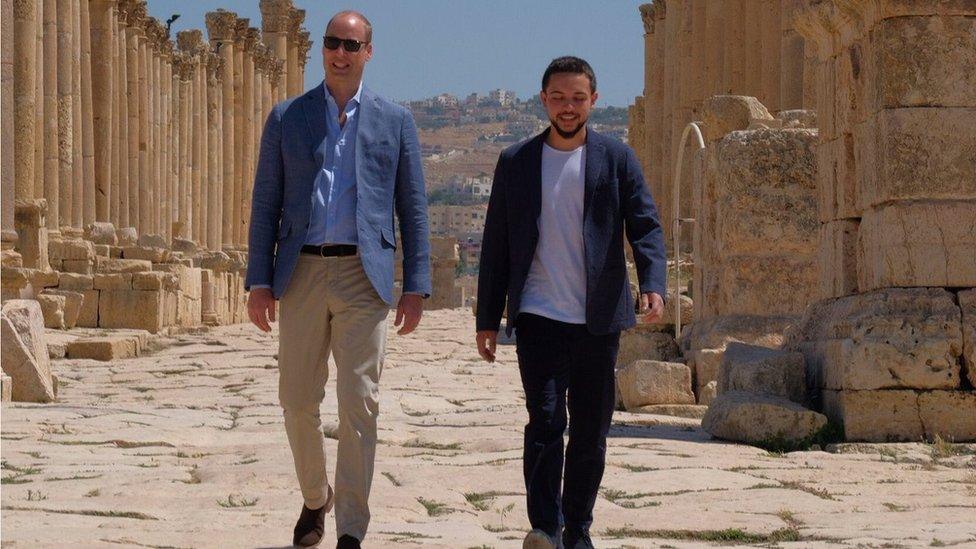
- Published24 June 2018